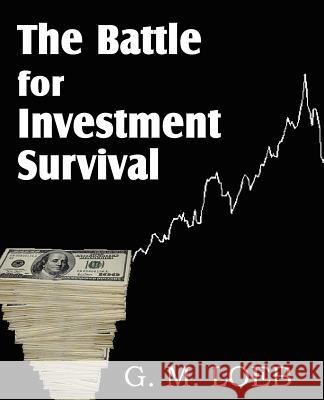The Battle for Investment Survival » książka
The Battle for Investment Survival
ISBN-13: 9781612032993 / Angielski / Miękka / 2011 / 192 str.
The Battle for Investment Survival
ISBN-13: 9781612032993 / Angielski / Miękka / 2011 / 192 str.
(netto: 68,37 VAT: 5%)
Najniższa cena z 30 dni: 71,59
ok. 16-18 dni roboczych
Dostawa w 2026 r.
Darmowa dostawa!
"The publication of this new and greatly enlarged edition of The Battle For Investment Survival is due to two factors--the steady demand for the other edition which is now out of print and the generally flattering comment made by various readers of that edition. The contents of the earlier book are included here, practically without change, but this edition contains considerable additional material. "Any earner who earns more than he can spend is automatically an investor. It doesn't matter in the slightest whether he wants to be or not, or even whether he realizes that he is investing. "All the above boils down to the necessity of measuring the return from investments in purchasing power rather than dollars. You must get back a sufficient number of additional dollars to make up for lost purchasing power if prices are rising, and a high enough percentage of your original dollars if prices are falling. I put it this way because usually there is some profit from investments in times of rising prices (but rarely enough), and generally there are losses in times of falling prices, and usually too many."
"The publication of this new and greatly enlarged edition of The Battle For Investment Survival is due to two factors--the steady demand for the other edition which is now out of print and the generally flattering comment made by various readers of that edition. The contents of the earlier book are included here, practically without change, but this edition contains considerable additional material."Any earner who earns more than he can spend is automatically an investor. It doesnt matter in the slightest whether he wants to be or not, or even whether he realizes that he is investing."All the above boils down to the necessity of measuring the return from investments in purchasing power rather than dollars. You must get back a sufficient number of additional dollars to make up for lost purchasing power if prices are rising, and a high enough percentage of your original dollars if prices are falling. I put it this way because usually there is some profit from investments in times of rising prices (but rarely enough), and generally there are losses in times of falling prices, and usually too many."











